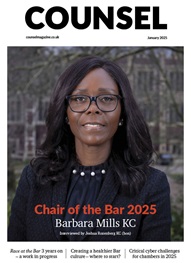Addressing the Public Child Care Law Conference, in London in June, Ryder J said the Court would be “the vehicle for a radical change of culture” and could be fashioned “in the image that you and I want”. The Court will be directly managed by the judiciary and led by the President of the Family Division. Family judges and magistrates of all levels will be members.
Ryder J was due to publish the judiciary’s proposals for family justice (as Counsel goes to press) at the end of July. The modernisation programme will be in two phases, each lasting about a year.
Phase 1 will put in place the structures and management necessary for the Court, including new rules and practice directions covering the distribution of business, appeals and the use of experts. A body of new judicial guidance will be created relating to the deployment of judges, magistrates and legal advisers, listing and judicial continuity.
Evidence-based good practice pathways and guidance for reducing delay and improving outcomes for children will be drafted. All authorised family judges, specialist legal advisers and magistrate’s trainers will be trained in these good practice materials before next autumn.
Ryder J said a new Care Monitoring System has been trialed since 1 April and will provide information about workload, reasons for adjournments, use of experts, allocation of cases and timeliness. This is in response to criticisms in the Family Justice Review about the lack of reliable management information.
Phase 2 will begin in autumn 2013 with judicial training and will see the Court prepare for the implementation of the Children and Families Bill, which is likely to impose a 26-week time limit on most child care cases.
Ryder J said the management of individual care cases “needs urgent reconsideration”. Proper use of resources should be made, and “the overuse of experts to confirm the evidence that is already before the court or to provide a multi-layered excuse for decision making is... not appropriate”.
A 26-week timetable track or set of pathways will be created, along with good practice guides covering matters such as pre-proceedings, evidence and care plan scrutiny.
Ryder J said a private pathway would be devised for litigants-in-person – the number of unrepresented litigants is expected to rise dramatically after April, when legal aid is withdrawn from parts of family law. This would set out what they can and cannot do and how to do it, and would include a procedure to help the Court identify urgent or risky cases.
Family bar
The new Family Court, due to be launched next autumn, will be “a once in a lifetime opportunity”, according to Mr Justice Ryder, the judge in charge of the modernisation of family justice.

